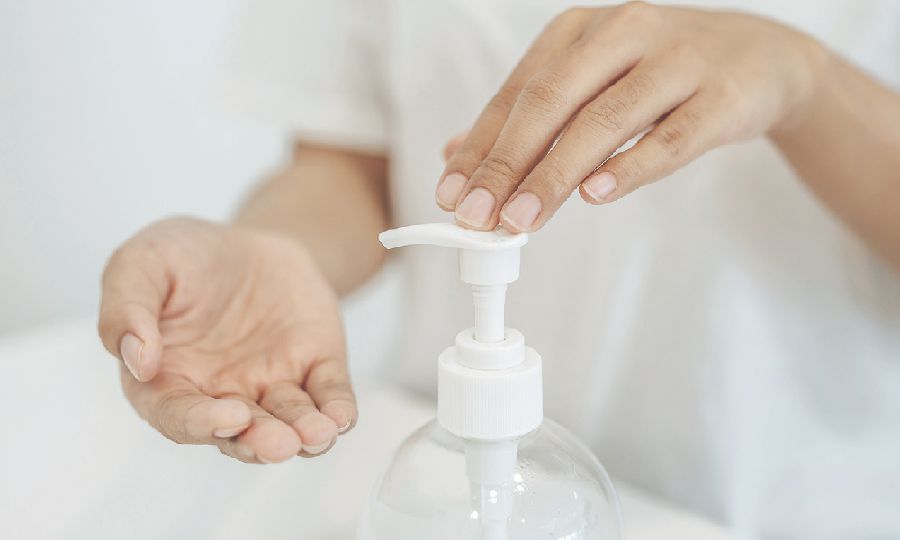
This post is also available in: Tiếng Việt (Vietnamese)

Authors:
You can wash your hands by rubbing your hands with an alcohol-based solution or by washing your hands with soap and clean water. For good hand hygiene, we must know the characteristics of each chemical used in hand hygiene.
From there, we use them appropriately in specific situations to achieve high efficiency in the prevention of hand disease, foot-and-mouth disease, gastrointestinal diseases, hepatitis A, E …, helminths.
Soap has become an indispensable tool for personal hygiene in our daily life. Soap is a compound containing esterified fatty acids and sodium or potassium hydroxide with a detergent function.
Thanks to the detergent contained in the composition, the soap has a cleaning function. These detergents have a high surface tension, which removes dirt and organic matter from the hands.
The soap contains no antibacterial active ingredient, so it has little or no antibacterial activity. Washing your hands with soap will help remove the bacteria, fungi and parasites that live on your skin.
These are germs that can easily be transferred to become germs responsible for diseases dangerous to health. According to the US Centers for Disease Control and Prevention, washing hands with hot water and soap increases the effectiveness of germs control. However, washing your hands with soap does not remove bacteria that are deposited in the epidermis, so it does not eliminate all the pathogens on the hands.
Soap comes in different forms: cake, liquid or powder. Even if your skin has been reconstituted and prepared at a neutral pH, washing your hands with soap and water can cause side effects such as irritated dermatitis or dry skin. The soap at home is safer and less bacterial because fewer people use it.
Therefore, simply clean the soap before using it to reduce the bacteria. At the same time, it is necessary to keep the soap in a box with a lid and a drainage hole so that the soap stays dry. According to the US Centers for Disease Control and Prevention, liquid soap is home to more germs.
Therefore, the liquid soap must be well preserved. If you want to reuse a soap dispenser, wash it thoroughly before adding new soap. Therefore, in public places, the best way to prevent soap pollution is to provide liquid soap in a closed container with a dosing pump.
Dry hand wash is a liquid, gel or foam hand sanitizer containing isopropanol, ethanol or n-propanol, or a combination of any of these ingredients or with an antiseptic, which is added as a moisturizing additive, skincare;uUsed by hand until the alcohol evaporates, do not use water. Just put it in the hands, apply evenly for 30 seconds.
The dry hand sanitizer is used in the following cases: before and after meals, outdoor activities, after handling money … The dry hand sanitizer is extremely suitable in cases where you are rushing or there is insufficient hand hygiene under the faucet.
Many people routinely use hand sanitizers to wash their hands and reduce bacteria, believing that, according to the US Food and Drug Administration (FDA) standards, dry hand sanitizers include chemical products. Ethanol, deionized, sodium lactate, perfume, benzalkonium chloride …, in which ethanol – the basic ingredient of alcohol, beer and other types of alcoholic beverages – has the ability to kill microorganisms by altering the properties of the protective protein coat of proteins that makes them insensitive paralysis and no longer develop.
But most hand sanitizers contain 60% alcohol and are not enough to kill bacteria. They are not as effective as washing your hands with soap. In addition, many lotions for hand washing containing phthalate are used as an odor. This is a product of chemical toxicity in the body affects the fertility.
Read more post:
Some studies show that excessive use of disinfectant for dry hands many times and for long periods of time to disinfect does not work completely. By cons, it has adverse effects on the health of users: drying hands; destroy the natural protective layer of the skin of the hands; weaken the immune system of the child; cause skin allergies if there is a wound …
Handwashing with soap is considered an effective, economical and effective dose of “vaccine”, foot-and-mouth disease, foot-and-mouth disease, gastrointestinal disease, etc., which can still be used to protect health.
References: